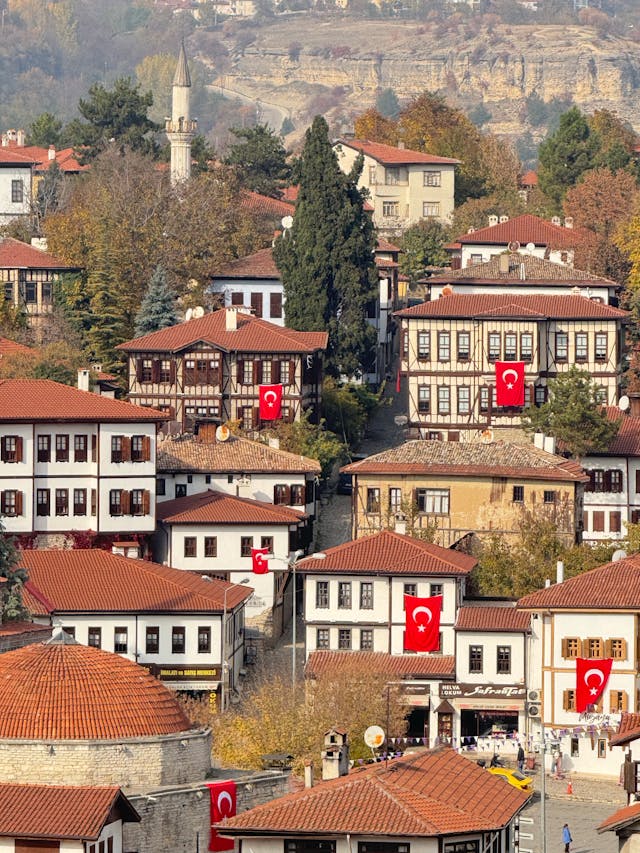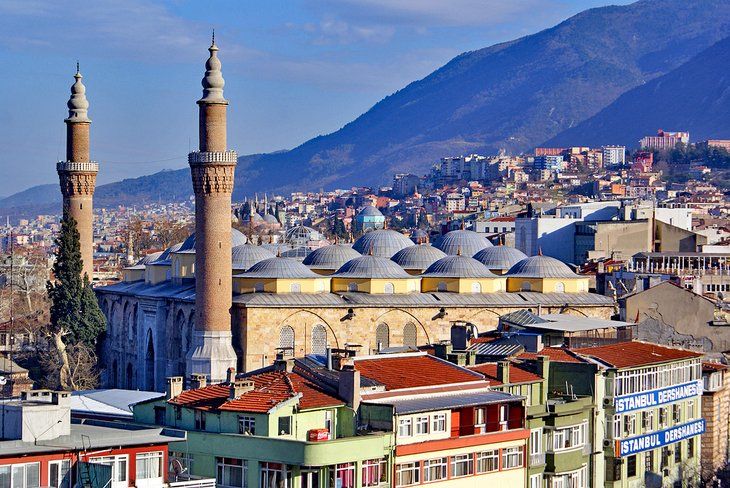CHAT
WITH US
WITH US
GET A
QUOTE
have questions? call us
+44 3330 907053

Moving Guides • Europe • 16 Sep 2024
Share this article
Moving to Turkey from the UK could be a great adventure. You'd get to explore a new culture, enjoy stunning views, and live affordably. But, there are important things to know, like how to get a residence permit. This is necessary if you plan to stay past 90 days without a visa.
Below we'll outline everything you need to know about a UK move to Turkey.

Turkey is a unique spot, connecting Asia and Europe. It blends Eastern and Western cultures. It's known for its rich history, lively cities, and varied landscapes. These aspects make it an intriguing place to move to.
The great weather is a big draw for Brits in Turkey. You can pick between the warm coast or the changing inland seasons. The cost of living is also good value, beating many Western European countries. This means your money can go further, from the shops to eating out.
For moving, UK citizens can visit Turkey without a visa for up to 90 days in 180. But, to stay longer, you'll need a special visa or residence permit. Make sure your passport has at least six months' validity when you arrive.
You can easily open a bank account in Turkey if you're from another country, like the UK. You'll need a special number for this. Property is a smart buy, with the Turkish Lira's value making it attractive for foreign buyers.
Healthcare is key, but UK and Turkey don't share medical agreements. It's wise to get good travel and health insurance. If you work in Turkey, private healthcare is a must. The good news is Brits already paying into the UK system don't need to join Turkey's social insurance.
Don't forget to get into the local life and meet other expats. This helps you settle in and enjoy Turkey's social life. Making local and expat friends can really improve your experience.
Moving to Turkey from the UK requires knowing about visa and residency rules. It doesn't matter if your stay is short or long. It's important to follow Turkey's migration rules to prevent any trouble.
If you're a British citizen visiting Turkey for tourism or business, you can stay up to 90 days visa-free within 180 days. Yet, for a longer stay, you must apply for a visa. The type of visa you need depends on why you are staying:
Staying over 90 days? Then, as a UK national, you must get a Turkish residency permit. Apply for the permit before your 90-day tourist period ends. You can do this either before you arrive or once you are in Turkey. Make sure your passport is valid for at least six months from your arrival. This is a Turkey migration requirement.
To extend your stay, you need to renew your residency permit at least 60 days before it ends. Letting it expire can lead to fines or being sent back home. Make sure to renew it in time. How UK pensions and National Insurance affect your renewal is also something to consider.
Here's a look at how much a Turkish residency permit costs:
Item | Cost in Turkish Lira | Cost in British Pounds |
| Initial Application | 356 | £15 |
| First Month Fee | 490 | £20 |
| Additional Month Fee (each month) | 98 | £4 |
| Total Yearly Cost | ~2000 | £83 |
| Entry Visa (if needed) | 2304.20 | £95 |
By knowing and following Turkey's visa and residency rules, your move and stay will be much easier.

The healthcare system in Turkey offers many choices for those relocating from the UK. However, it's important to note some key differences. Unlike in European countries, the Global Health Insurance Card (GHIC) doesn't work here. So does the European Health Insurance Card (EHIC). Before you move, getting the right medical insurance in Turkey is a must. In 2023, more than 200 people got Salmonella after visiting Turkey. This shows the need for good healthcare coverage.
Turkey has a system where everyone can access healthcare, but only after living there for a year. For newbies, it's vital to get private medical insurance. Lots of Turkish companies offer plans that are perfect for people from abroad. Recent news includes six British people who died after medical treatments. This is a big sign to really look into your healthcare provider.
Having doctors who speak English can make things much easier for new expats in Turkey. You can find English-speaking doctors, especially in big cities and places where tourists go. It's key to check on the HealthTurkiye website for a list of recommended medical experts. Learning a bit of Turkish can help, but most English-speaking doctors reduce language barriers.
Not all the medicines you might take in the UK are available in Turkey. It's big to know if you can get your medicines before you arrive. Talking with local doctors or pharmacists is smart to make sure you will get what you need. Make sure you're up-to-date on vaccinations, like Hepatitis A and B, Rabies, and Tetanus. This is especially important if you might be around animals. Always get medical help if an animal bites you. And think about COVID-19 risk, which changes based on where you are in Turkey.
Looking for the right place to stay in Turkey is key for those planning a move. Whether you want short-term rental or to buy a home, there are important things to know. This includes the rules, how it all works, and which cities are popular for people moving from other countries.
In Turkey, there are many places to rent. This makes it simple for people from the UK to find a home there. Renting first can be a good idea. It helps you understand if the place is right for you. Rental agreements in Turkey differ but usually cover things like repairs, bills, and a deposit. It's best to look for places through trusted websites and use local agents to avoid trouble.
Understanding the rules for buying property in Turkey is crucial. Brits should check advice from the Turkish Foreign Ministry. It talks about checks you need to pass and permits you must get, especially because some areas are off-limits to buyers from other countries. Buying could be delayed by three weeks to get military approval. Foreign buyers can get loans from Turkish banks but will need to pay an expert for a property value report. Both the buyer and seller have to pay a tax of 2%.
Many cities in Turkey are popular with foreigners, with Istanbul, Ankara, and Izmir leading the way. Istanbul is loved for its lively atmosphere and history and is the top choice for many. Ankara is the country's capital, mixing past and present. Izmir has a beautiful coast and mild weather, making it a favourite for those wanting a quieter lifestyle.
Antalya is also gaining attention for its natural beauty and value for money. About 21% of foreign buyers choose this city. Knowing about rental and buying rules will help in a smooth move to Turkish cities. Keep in touch with local updates and advice.

To work in Turkey, UK expats need a Turkish work visa and permit. They must follow the country's work laws. In Turkey, there's a big need for skilled workers in fields like teaching and tourism. So, many jobs are open to people moving from the UK.
Working in Turkey has some great benefits for UK expats. There's a deal between the UK and Turkey about social security. This deal means you won't pay into Turkey's Social Security Scheme (SGK) if you pay UK National Insurance. It makes working in Turkey a bit cheaper and easier to plan for.
There's also an agreement between the UK and Turkey on taxes. This deal stops you from paying tax on the same money in both countries. So, you won't be taxed twice on your earnings in Turkey if you're a UK expat.
Requirement | Details |
| Visa and Work Permit | Mandatory for all foreign nationals looking to work in Turkey. |
| Social Security Contributions | UK expats paying UK National Insurance are exempt from SGK contributions. |
| Double Taxation Agreement | Prevents paying tax on the same income in both the UK and Turkey. |
To live or own property in Turkey, UK expats need a unique ID number. It's crucial for following all the local rules. Getting this number is an important step for a hassle-free move.
In Turkey, there are many job opportunities. But, some fields face challenges like not enough skilled people and tough rules for foreign workers in areas like law and medicine. Despite this, with the right planning, working in Turkey can be very fulfilling for UK expats.
Turkey is great for those who want to save. Even though salaries are lower, the cost of living is much cheaper. This is because things like utilities, transport, and eating out cost less.
Your monthly spend in Turkey depends on how you live and where you are. For example, rent for a 1-bedroom flat in the city can be between 10,000.00 TL and 31,286.16 TL per month.
If you are looking to buy, prices are reasonable. In city centres, you might pay from 2,972.87 TL to 11,148.27 TL per square feet. Outside city centres, it can be as low as 1,858.05 TL to 6,967.67 TL.
Utility bills in Turkey are much lower. You'll spend less on gas, water, and electricity than in the UK. Even internet is 72.1% cheaper. These savings make life in Turkey more affordable.
Getting around in Turkey is cheap. A monthly public transport pass costs between 275.00 TL and 1,389.00 TL. This is much cheaper than in the UK. It means you can save on your daily travel costs.
To help you see the savings, here's a quick comparison with the UK:
Expense | Turkey | UK | Difference |
| Meal for 2 People, Mid-range Restaurant, Three-course | 600.00 TL - 2,000.00 TL | 59.6% cheaper | - |
| Monthly Pass (Public Transportation) | 275.00 TL - 1,389.00 TL | 82.8% less | - |
| Preschool (or Kindergarten), Full Day, Private, Monthly for 1 Child | 6,250.00 TL - 25,000.00 TL | - | - |
| Rent for an Apartment (1 bedroom) in City Centre | 10,000.00 TL - 31,286.16 TL per month | 59.9% to 65.3% decrease | - |
| Internet Services | 72.1% less | - | - |
Living in Turkey on a budget is possible. Make a plan for your expenses. With the right approach, you can live well and save in Turkey.
Turkey is a top choice for studying abroad, welcoming about 250,000 students every year. It's among the top ten places for international learners. The country boasts over 200 institutions, with 120 public and 87 private universities. These universities offer a wide range of educational options. Out of the 25 Turkish institutions in the QS World University Rankings for 2024, six rank in the top 600.
To study in Turkey, students usually need to follow some important steps. UK citizens, for example, must get a student visa. They can do this by applying at the Turkish consulate in the UK. After arriving, students also need to get a residence permit. This permit should match the length of their study. Doing this helps students follow Turkish immigration laws correctly.
In Turkey, the academic system gives students a lot of freedom to choose their path. A bachelor's degree often takes four years to complete; some special degrees like architecture, dentistry, and medicine might take five or six. Master's programmes last around two years and have the option of doing a thesis. Doctoral degrees usually last from three to four years and involve working closely with professors throughout.
Studying in Turkey is known for being budget-friendly, especially for international students. Tuition fees at public universities range from TRY 2,888 to TRY 115,555 (£86 to £3,455). This cost might change based on the language of your course. The cost of living, including rent, clothes, and travel, is estimated to be between TRY 2,250 and 3,000 (£68 to £90) per month.
There are also many scholarships available for students to help cover costs. Programs like the Türkiye Burslari Scholarship and scholarships from universities like Sabancı and Bilkent can be a great help. It's a good idea for students to look into these scholarship opportunities.
Comparing Turkish and UK qualifications is important for your study plans. Thanks to Turkey's involvement in the Bologna Process, its education system meets European standards. This makes it easier for qualifications to be recognised across Europe.
Here are some essential facts for anyone thinking about studying in Turkey:
Aspect | Details |
| Top Universities | 25 institutions ranked in QS World University Rankings 2024 |
| Typical Costs | TRY 2,888 to TRY 115,555 (£86-£3,455) per year |
| Living Expenses | TRY 2,250 to 3,000 (£68-£90) per month |
| Student Visa Processing Time | 15-45 days |
| Scholarships Available | Türkiye Burslari, Sabancı University, Bilkent University |
| Work Opportunities | Undergraduates can work from the second year of study |
| Language of Instruction | 20,000+ English-speaking courses |
Studying in Turkey is a wonderful experience, with plenty of affordable places to stay and easy ways to get around. It's important to make sure you understand all the steps, from getting your student visa to knowing how much everything will cost. This way, your time studying in Turkey will be enjoyable and successful.

Moving to Turkey involves lots of steps. You need to pick a good removals company. And you must know about customs and how to bring your pets. We'll give you key advice to make moving easier.
It's vital to pick a skilled company for your move to Turkey. "Deliver1" is a top choice. They make moving stress-free. Your items will be safe and reach you on time.
Getting customs rules right makes your move smoother. You can bring personal items duty-free with a residency permit. This process usually takes 4-5 days.
If you're flying in, you'll need a long-term stay proof. This can be a rental contract for over 24 months. Remember to list your personal items on time. And don't bring alcohol or tobacco.
Moving pets to Turkey has strict rules. Make sure they have health certificates, vaccinations, and microchips. Turkey has a list of banned dog breeds. Follow the rules to avoid problems.
Plan well for your move to Turkey. Know the customs and pet rules. This will help your transition go smoothly.
Moving from the UK to Turkey is an exciting step. It introduces new chances and adventures. This guide stresses the need for research and understanding. These are crucial to make your move easy. Knowing about property investment, work permits, or the Citizenship by Investment programme is important. It will guide you through these steps smoothly.
Turkey is known for its rich culture and beautiful sceneries. It welcomes foreigners warmly. Getting Turkish citizenship is quick through the right investments or staying longer. Plus, it's flexible to plan your visit with easy access to various visas.
Connecting with locals and other expats can make your Turkish life better. It helps you blend in and offers help when needed. Companies like SDC International Shipping can make your move stress-free. This way, you can enjoy the thrill of starting anew in Turkey. Always prepare well, and follow the rules to start a great life there.
Key points to remember:
By following these guidelines and staying informed, your move to Turkey can be a rewarding experience. Embrace the new culture, enjoy the beautiful landscapes, and make the most of this exciting new chapter in your life.
We love hearing from you-so please get in touch with any questions or queries.
We love hearing from you-so please get in touch with any questions or queries.
Working hours
Mon - Sat: 08:00 - 17:00
Sun: Closed
Call
+44 3330 907053Location
Unit 3, Newyears Green Lane
Newyears Green
Uxbridge
UB9 6LX
United Kingdom
